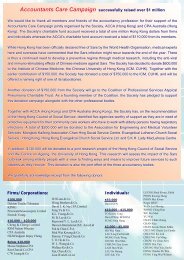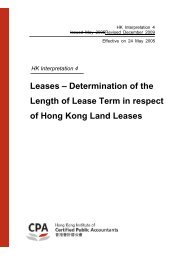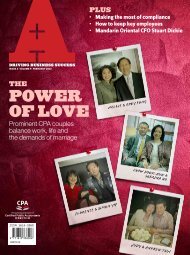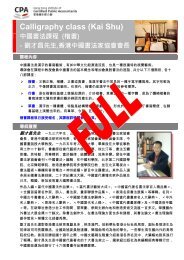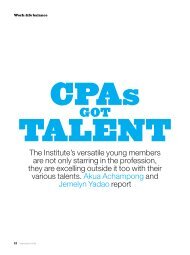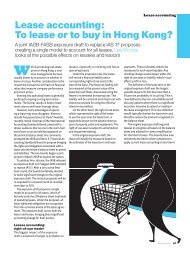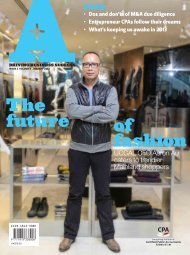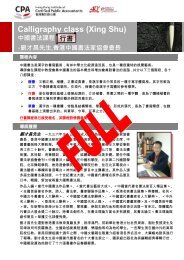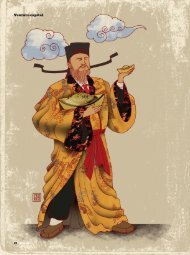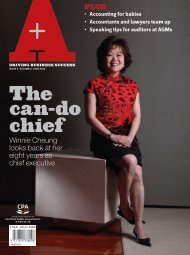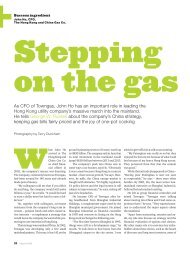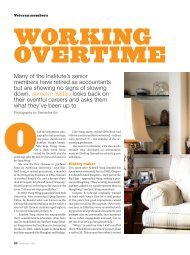launderers hung out to dry - Hong Kong Institute of Certified Public ...
launderers hung out to dry - Hong Kong Institute of Certified Public ...
launderers hung out to dry - Hong Kong Institute of Certified Public ...
Create successful ePaper yourself
Turn your PDF publications into a flip-book with our unique Google optimized e-Paper software.
Anti-money laundering<br />
ing moneychangers and remittance agents<br />
<strong>to</strong> be licensed entities.”<br />
Second, Morris says the ordinance provides<br />
some teeth <strong>to</strong> existing regulations enabling<br />
criminal sanctions <strong>to</strong> be imposed on<br />
<strong>to</strong>p <strong>of</strong> administrative penalties.<br />
Third, it provides some additional clarification<br />
on steps regulated entities can take <strong>to</strong><br />
ensure an adequate compliance programme.<br />
“This could include the use <strong>of</strong> a risk-based approach<br />
<strong>to</strong> determine the level <strong>of</strong> due diligence<br />
needed around a cus<strong>to</strong>mer,” Morris explains.<br />
The <strong>Hong</strong> <strong>Kong</strong> ordinance is now closer<br />
<strong>to</strong> international anti-money laundering<br />
standards. “Although U.S. and [the previous]<br />
<strong>Hong</strong> <strong>Kong</strong> legislation were both enacted <strong>to</strong><br />
combat terrorist financing, the U.S. legislation<br />
was more comprehensive and far reaching,”<br />
says Sara Nelson, a Miami lawyer who<br />
has compared the two regimes. “This moves<br />
<strong>Hong</strong> <strong>Kong</strong> closer <strong>to</strong> global standards.”<br />
Another significant change is terminology.<br />
“The amendment redefines terms<br />
32 Oc<strong>to</strong>ber 2012<br />
so that the law now relates <strong>to</strong> ‘property’ instead<br />
<strong>of</strong> ‘funds,’ which was an unnecessarily<br />
restrictive term,” says Nigel Morris-Cotterill,<br />
a Kuala Lumpur lawyer who heads the<br />
“ The amended<br />
ordinance brings<br />
<strong>Hong</strong> <strong>Kong</strong> in<strong>to</strong> line<br />
with the United<br />
Nations standard <strong>of</strong><br />
phraseology.”<br />
Anti-Money Laundering Network, a nonpr<strong>of</strong>it<br />
consultancy that provides training <strong>to</strong><br />
the financial sec<strong>to</strong>r.<br />
“That increases the scope <strong>of</strong> property<br />
that can be frozen, seized and confiscated<br />
and the persons whom orders can be made,”<br />
he adds. “Basically, the amended ordinance<br />
brings <strong>Hong</strong> <strong>Kong</strong> in<strong>to</strong> line with the United<br />
Nations standard <strong>of</strong> phraseology.”<br />
Morris-Cotterill adds that the effect <strong>of</strong><br />
the changes go beyond mere wording. “Underneath,<br />
it has an impact on the financial<br />
institutions…and puts lending on exactly<br />
the same risk management footing as deposit<br />
taking. It’s not just simple lending: it’s<br />
leasing, trade finance and all other business<br />
areas that might have previously appeared<br />
relatively low risk in relation <strong>to</strong> money<br />
laundering.”<br />
Burden <strong>of</strong> compliance<br />
One significant issue for <strong>Hong</strong> <strong>Kong</strong> financial<br />
institutions looking <strong>to</strong> beef up controls<br />
is the costs involved. “We see banks having<br />
<strong>to</strong> spend more on anti-money laundering<br />
sanctions compliance,” says Paul McSheaffrey,<br />
a partner at KPMG and an <strong>Institute</strong><br />
member, who added that compliance with<br />
the U.S. Foreign Account Tax Compliance Act<br />
and the Wall Street Reform and Consumer<br />
Protection (Dodd-Frank) Act were already



